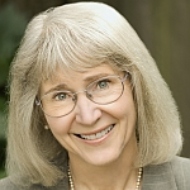The big blue Institute for Creation Research logo at the top of the page stood out from all the other colorless, bland papers and letters. What the dickens was Duane Gish, ICR debater extraordinaire, writing about to Jack Friedman (right), NCSE board member and chair of the New York Council for Evolution Education? I didn’t expect to find correspondence between these two opponents in the Friedman Archives at NCSE.
The December 1987 letter began, “Mrs. Sunderland sent me a copy of your letter of November 16 to the family of Luther Sunderland.” Luther Sunderland was a well-known creation science proponent in the 1970s and 1980s, the author of Darwin’s Enigma, and perhaps best known for his surreptitious audio tape and transcript of paleontologist Colin Patterson’s 1981 talk on cladistic systematics at the American Museum of Natural History. From the latter, much hay was made by creationists from out of context quotes to claim that scientists—when they thought they were speaking among friendly fellow scientists—would confess that evolution truly was a scientific house of cards with no solid support. Everyone from the ICR to the Australian creationists to “intelligent design” proponent Phillip Johnson quoted Patterson to “prove” that, for example, there were no transitional fossils (see Eugenie Scott, “Colin Patterson, Cladistics, and Creationists,” NCSE Reports 1992;12(4):14–15).
Luther Sunderland died in 1987. At this writing, I haven’t yet found the letter Jack apparently had written to Sunderland’s widow—a stranger—but I can easily imagine what it would have said. Jack was warm and gentle—and diplomatic—and he would have identified himself as on the other side of the creationist controversy from her husband, but nonetheless expressed his sympathy for her loss.
Gish went on to write, “It is my hope that all of our deliberations and debate on the subject of origins can be carried out in such a spirit. We may agree to disagree, but we can always respect one another and admire those good qualities that we see in each other.”
Finding the letter got me thinking about the general lack of civility in the creationism/evolution controversy today. Believe me, thirty or so years ago partisans felt just as strongly about the correctness of their views as anyone writing on blogs today. What is different now? The Internet, which makes it easy to insult at a distance, rather than face to face, removes some inhibitions. That’s certainly part of it. And being able to make anonymous comments online definitely seems to have a negative effect on civility. But I wonder whether in our current age we haven’t forgotten a deeper truth about our common humanity. It’s easy to empathize with those like us; it’s more difficult to recognize ourselves in those with whom we disagree.
Creationists and climate change deniers are our opponents, not our enemies. We and they ultimately are in the business of trying to persuade people towards our point of view—and occasionally, trying to persuade someone from the other side. Whomever we are trying to persuade, that person on the other side of the conversation—digital or actual—is someone much like us. To use a favorite creationist phrase, we both have strengths and weaknesses, and we also have same suite of feelings and emotions. As humans, we are more alike than different. Jack certainly thought of Luther Sunderland as an opponent, and vigorously opposed his efforts to get creationism into the New York Regents Exam and other deeds attacking evolution education. Yet Jack simultaneously viewed Sunderland as a fellow human being with a family that loved and missed him after he died, hence his impulse to write a sympathy letter. It speaks well of Jack.
Similarly, when NCSE board member and fierce creationist opponent Bob Schadewald learned that young Earth creationist Kurt Wise had lost his library in a fire, he packed up many boxes of duplicates from his own library and sent them to Wise to replace the lost ones. After all, creationists and creationist fighters have a lot of the same books! Like any bibliophile, Bob could imagine the pain of losing hundreds of books—regardless of which books you thought got it right.
Gish’s letter in response also speaks well of Gish, to acknowledge a strong opponent’s humanity in the way he did. We’re opponents, not enemies. Good to be reminded of that from time to time, especially when our current modes of communication make it so easy to be uncivil.

